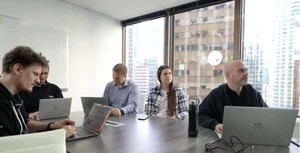Strive takes a step towards the big time

Strive Gaming, a gaming platform provider with a sole focus on the North American market, is taking on a host of industry giants as it looks to grow its customer base across the US and Canada. And with some big operators building out a vertically integrated proposition, it’s competing against proprietary solutions as well as suppliers.
But as this week’s partnership to power PointsBet’s igaming offering in Canada shows, it can take on the biggest competitors and win.
A team of industry pioneers
It’d be easy to position Strive as an industry upstart, but with a leadership team featuring a trio of US betting pioneers, it comes with strong pedigree. CEO Max Meltzer and president and CCO Damian Xuereb were responsible for a flurry of deals in the wake of PASPA’s repeal during their time at Kambi. CMO Jamie Shea oversaw the launch of New Jersey’s first mobile sportsbook at DraftKings.

“The platform is designed around our industry experience,” Meltzer says. “We have more B2C operational experience than any other player account management (PAM) and we recognise what’s needed to be a success: to deploy quickly, to have a configurable solution, move state to state for customers from the same single office.”
Even its client base, in the early stages of its growth, includes names that will make larger platform providers envious. It already supplies DraftKings, via Golden Nugget Online Gaming, Betsson’s Betsafe and Desert Diamond in Arizona. PointsBet expands the list of high-profile partners further, thanks to a four-year deal to deploy Strive’s PAM platform for its igaming offering.
PointsBet deal “a natural next step” for Strive
To chief executive Meltzer, it’s the right time for Strive to take on a client of PointsBet’s size in Canada.
“It’s a natural next step for us,” he explains. “Over the the past two years we have been establishing ourselves, proving we can be quick to market, scalable and without tech debt, which has really resonated [with the industry].
“Since then we’ve vastly built out our Vancouver, Newcastle and Malta offices, to build a really slick operation. It makes sense to take on such a large multi-state operation.
“It’s a very significant moment for us. We’ve been planning for this [size of client] since day one.”
Are North American operators rethinking their partnership rosters?
The announcement also comes amid a flurry of bed-hopping across the industry. This is as operators switch suppliers, acquire systems or even build their own. In some ways, this opens up new doors for Strive in that there’s more scope to entice organisations away from their existing partners. In others, it potentially raises risk levels as companies look to control their own tech stack.

However Meltzer argues there’s increasing scope for outsourcing expertise. There’s plenty out there to suggest a vertically integrated proposition is “not necessarily the way to win in the long term”, he points out.
“There’s not enough strategic value in buying businesses. The market has told us that. You need to show success from the bottom line, with a product that’s sticky and drives long-term value,” he explains. “That’s exactly where we fit.”
To put it simply, Strive offers an edge on the competition. Meltzer claims it’s integrated with more sportsbooks and casino vendors than any other PAM. It also offers a host of payment providers, KYC solutions and geolocation services.
Lifting the hood on Strive’s PAM
Strive’s gaming platform offers something that is very hard to replicate, Meltzer continues. Building anything in-house would take years.
Operators built out hefty player bases in the acquisition spree that typified the early years of US sports betting. As the focus turns to retention, they need a product that keeps them engaged and playing.
“Our platform is laid out for operators to track customers from a single back office, moving from state to state with a single wallet,” he says.
Its infinity engine automates workflows to better engage customers, while a dedicated data analytics team is building out AI models. This use of data is “a key battle for the industry”, utilising data to keep customers engaged and playing responsibly.
Laser focus on North America
But Meltzer believes Strive’s “laser focus” on North America gives it an additional advantage.
“The global regulatory landscape is becoming more and more complex, whether you’re looking at the UK, or Germany, or Brazil, through to North America,” he explains. “It’s a complex landscape of regulatory and technical requirements, meaning there are companies out there, even with their own gaming platforms, that use our PAM.
“Betsson has its own internal PAM, but recognises that using ours in North America makes sense, for example.”
Rival suppliers, meanwhile, may spread themselves too thin. “It’s difficult to focus on a launch in Pennsylvania or Ohio while trying to make sure you’re ready to be in Brazil, Peru, Germany or the Netherlands, so from a development focus it’s difficult to be spread across all these jurisdictions.”
This means “it hasn’t proven that difficult to be in the conversation if people want to outsource their PAM”.
“People know it’s incredibly complex. It’s not the most exciting part of the business so operators might want to look at more creative elements such as the front end or marketing. We provide the expertise so they can build on it.”
Will a lack of progress for online casino regulation slow growth?
But while Strive is targeting growth across all verticals, two of its major deals in Golden Nugget Online Gaming and PointsBet focus on icasino. Early hopes of a wave of legalisation to take the vertical into more than its current six states in 2023 have been dashed in the current legislative session.
For Meltzer, online casino “is a highly engaging and profitable area for our industry and [operators recognise] its not enough to offer sportsbook alone”.
The lack of progress in 2023 doesn’t bother him, however. It gives the industry time to test and prepare for 2024.
That year, he predicts, will be “a huge year for sports and icasino approvals. Next year will be the wave, where we see something exciting happen. This year has given everyone an opportunity to get their product ready. My boldest prediction is something to happen with icasino in New York.
“In my previous business, I worked to get people live, but people were focused on speed rather than quality. 2023 has been the year of quality, where you’ll see which casino games work. There are differences between the states so we should be learning as much, testing as much and getting as much content through.”
Creating an ecosystem around gaming
Adding online casino to the mix also expands the gaming ecosystem, something Meltzer believes is a key point of differentiation between North America and Europe.
“From the way [operators] approach things, it’s not so much how they differentiate the sportsbook product, but how they differentiate the whole experience.
“DraftKings has sportsbook, daily fantasy and casino, then acquired Golden Nugget Online Gaming and built out their NFT marketplace. Fanatics is just at the precipice of what they’re trying to achieve, in combining sports betting with merchandise.”
This approach of incentivising players through non-cash bonuses is being replicated across other providers, such as Prizeout, where vertical integration is less about owning the tech stack and more about piecing together the products and prizes.
“That’s the way I see [North America] going; obviously there’s differences in their proposition, but it’s not sticking to the traditional way of rewarding players from a technical standpoint,” he says. “They’re going to be able to reward dynamically and that’s what I perceive the big players to be doing.
“It’s exactly what we’ve designed our platform for. It’s not just an igaming platform, it’ll grow depending on what people want to add in.”
The client base grows
And there are more clients already lined up. Meltzer says multiple deals have been signed already, and not yet announced.
“Even Ontario who we are going into with PointsBet, we’ve gone in with other customers. Customers unannounced include those ones that own property assets such as tribal operators, clients launching new brands, some of the big operators and hopefully in the coming months we’ll announce those.”
There are multiple gaming platform providers fighting for clients, not to mention the additional challenge of operators taking tech in-house. Meltzer and Strive are working to prove there’s room for more.

